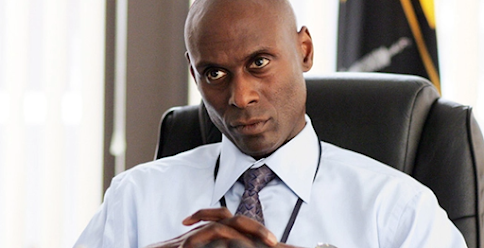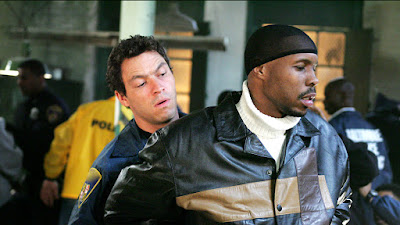Part 1Part 2Part 3At the start of the 21st Century, the story arc had begun to dominate dramatic television after some hesitancy on the part of the networks throughout the preceding two decades. The arrival of DVD in 1998 saw a marked change in attitudes to television, with people now buying up entire seasons of a TV show at a time, and this format made appreciating long-running storylines more practical. Not just genre television but big, mainstream shows like
Friends were now employing long-running storylines which millions of people were able to follow weekly with no problems.

Despite this, there was a curious failure to follow in the footsteps of
Babylon 5 and create a show with a pre-planned story arc with a beginning, middle and end. Most shows continued to make it up as they went along, sometimes effectively but more often leading to confusion and pacing problems. A show which fits into this bracket, and one of the most successful arc shows of this decade, is
24. Beginning in late 2001,
24 is presented in real-time, with each season taking place over the course of one day as counter-terrorist agent Jack Bauer fights off various terrorist threats to the United States. Over the show's seven seasons to date, Bauer has fought Middle Eastern terrorists and domestic enemies and saved LA from nuclear attack, being devastated by a bio-weapon and various other threats.
Given the limitations of the format, it would be logical to assume each season was pre-planned in some depth. However, each season is in fact written on the fly (with the notable exception of the seventh, which was delayed by a year due to the 2007 US Writer's Guild strike, giving the writers time to complete all the scripts and revise them before production resumed). This is especially notable in Season 1 during a rather odd storyline in which Jack's wife becomes amnesiac, a 'filler' storyline introduced to pad out the narrative for several additional episodes. This approach is problematic, leading to some dubious writing decisions, but on the other hand it does help give the show its trademark air of barely-controlled chaos.
24 became a huge hit show and a massive seller on DVD, showing the widening appeal of the story arc format.
The dominant television production company of the 2000s was almost certainly HBO. The Home Box Office cable channel had started life as a premium movie and sports channel but soon deviated into producing original, high-quality television programming. Free from the restrictions of regular network television (including no ad breaks), HBO could feature nudity and swearing and its shows were not limited by the traditional network production schedule, meaning that several years could elapse between seasons if deemed necessary. Critical acclaim was also deemed almost as desirable as high ratings. In short, HBO and several similar networks (such as Showtime, AMC and Starz) became famous as the homes of cutting-edge and original drama that the regular networks couldn't show.

The jewel in HBO's crown was
The Sopranos, which began airing in 1999 and ran for eight years. The story of a mobster family in New Jersey,
The Sopranos won great acclaim, significant ratings and huge DVD sales. The series had a number of story arcs which ran across its length, but the show stunned audiences with its final episode in 2007 which had several storylines still in-progress when it suddenly and abruptly cut to black fifteen seconds before the scheduled end of the episode. The show's creator, David Chase, had decided that some kind of neat conclusion would be unrealistic and simply chose to pull the camera and the audience out of his characters' lives almost at a random moment rather than with some kind of meaningful ending. Critics were divided, a lot of fans were pissed off and other writers loved the artistic daring of the maneuver. This kind of ending would probably have been challenged rather more thoroughly on a network show, but thanks to HBO's preference to give their showrunners greater artistic freedom they let Chase deliver his vision without hindrance.
Throughout the 2000s several other HBO shows garnered critical and commercial success, such as the WW2 drama
Band of Brothers, the New York comedy series
Sex and the City, the partially-improvised
Curb Your Enthusiasm (from
Seinfeld's Larry David, again complete with season-long story arcs) and the unusually death-fixated
Six Feet Under. A 2003 show named
Carnivale was notable for its pre-planned storyline, meant to sustain the series over six seasons. Creator Daniel Knauf saw the series as a trilogy consisting of three 'books', each lasting two seasons. With the show's expense not being reflected in its ratings or critical acclaim, HBO failed to negotiate a budget cut with Knauf and Knauf chose to end the show with the second season, completing the first 'book' of the story with some closure but also many storylines still in progress. Two further HBO series,
Deadwood and
Rome, also had ambitious storylines (planned to some extent) but were both cancelled due to creative and budget problems, leading to HBO garnering a bit of a reputation as a station that kills shows prematurely.

Luckily, this reputation was eroded by the successful conclusion of HBO's other great masterpiece,
The Wire. Airing for five seasons between 2002 and 2008,
The Wire was the creation of David Simon, whose
Homicide: Life on the Street series had been a success despite significant network interference and constant pressure to dilute the reality of life on the streets of Baltimore for a mass audience. Simon took advantage of HBO's greater artistic freedom to create a much bleaker, less compromising but also altogether more human series with complex characters, extremely detailed storylines and an unusual sociological commentary. The result was one of the greatest achievements in the history of television drama, meticulously constructed with each season mapped out in advance (and ideas and plans for later seasons being generated right from the start). The show won immense plaudits and, despite modest viewing figures for HBO, became a big-seller on DVD.
The Wire seemed to reinforce the argument made by
Babylon 5 that if you have an arc series you need to plan the story out in advance to get the best results.

Further reinforcement for this concept came from a source almost completely diametrically opposed to HBO's
The Wire.
Avatar: The Last Airbender was an animated show airing on Nickelodeon, running for 61 episodes from 2005 to 2008. But it also had a complex, pre-planned story arc, this time running for three seasons and depicting the attempts of the evil Fire Lord to conquer the world and the emergence of an 'Avatar' who can use all four forms of elemental magic to oppose him.
Avatar won critical acclaim (even from adult viewers) for its occasional dark moments, its sense of humour and its logical and well-thought-out storyline that was delivered in a relatively timely manner and concluded with a generally satisfying finale.

In 2003 the American Sci-Fi Network (now SyFy) resurrected
Battlestar Galactica, the 1978 show which was an early example of an arc-driven SF series. The new series, a total reboot of the concept, ran for four seasons and 75 episodes airing between 2003 and 2009. Roughly the first half of the run of the show was greeted with universal acclaim and kudos for its grittiness, its multi-faceted political commentary and its excellent acting and effects. However, the second half, starting a few episodes into its third season, was plagued by long inter-season delays, writing and pacing problems and some very odd story-turns. A loyal audience hung in there, hoping to see the show come to as barnstorming and satisfying a conclusion as its beginning. Instead, the final episode was lacking in logical coherence and several long-running mysteries, for which definitive answers had been promised by the showrunners, were simply not resolved at all. The finale shattered the previously strong fanbase into warring factions, between those dissatisfied with the outcome and those who believed the show was being ambiguous as a deliberate artistic statement, but the latter POV lost credibility when producer Ronald D. Moore confirmed that they made the show up as they went along and included ideas because they were cool or crazy rather than because they necessarily made sense. Whilst
BSG's early seasons remain jaw-dropping examples of television space opera at its very best, its ending seriously tars the quality of the whole series.
The last major arc show of the 2000s, and one whose ending will determine how it will be seen in the grand history of television drama and arc shows alike, is
Lost. Beginning in 2004,
Lost's final episode will air in May 2010. JJ Abrams conceived the show with a strong opening premise: an airliner crashes on a remote Pacific island and forty-eight of the passengers and crew survive. As the show progresses, it becomes clear that the island is not just an island and other people dwell on the island with their own agendas.

Abrams was (and remains) a very respected 'ideas' man, but his history in delivering satisfying long-form storytelling was patchy. His previous show,
Alias, had a very confused central story and petered out rather than coming to a satisfying conclusion, in a manner not dissimilar to the earlier
X-Files. Fans feared that
Lost would suffer the same fate, and after penning the pilot it indeed appears that Abrams did not have strong ideas for the overall shape of the series, although his co-writer and producer Damon Lindelof did have a few ideas for what was really going on. Abrams departed shortly after the pilot and Lindelof and his new writing team sat down and thrashed out a background concept and story for the series, but were hamstrung by not knowing how long the show was going to run for. This meant that major storyline developments came slowly and many filler storylines had to be introduced to keep the series ticking over. Dissatisfied with this as they moved into the third season, they convinced ABC to allow them to set an end-date for the show. With this achieved, the second half of Season 3 saw a marked improvement in quality and the dispensing of the filler material. Seasons 4 and 5 won additional critical plaudits as the storylines slowly begun to be tied together for their conclusion in the forthcoming sixth and final season (which begins airing at the start of February). How successful the finale is remains to be seen.
This brings the story of the story arc-driven TV series up to date. Today it's a normal component of television drama. From
Desperate Housewives to
Doctor Who, the use of ongoing storylines and recurring plot elements is now standard, but the pre-planning of such story arcs remains strangely the exception rather than the rule.
Battlestar Galactica's creative failure at the last hurdle was unusually problematic, but the mildly tedious filler elements that
24 is occasionally forced to throw up and
Lost resorted to in its late second and early third seasons show that mishandling or not planning your storyline in advance can be a bad idea.
Lost's later, greater coherence and tighter storytelling is an excellent example of how giving a TV show direction and purposes can improve its quality, whilst
Avatar: The Last Airbender and
The Wire both show that pre-planning can be the key to ensuring your show ends strongly. It now remains to be seen if
Lost matches the quality of their finales, and if future TV shows will learn from their success.



























